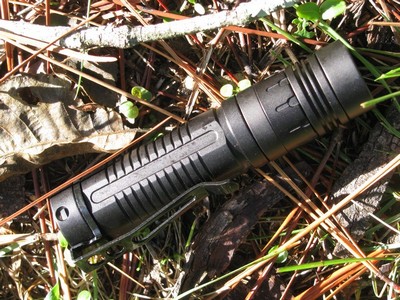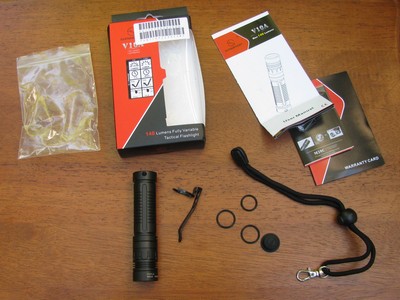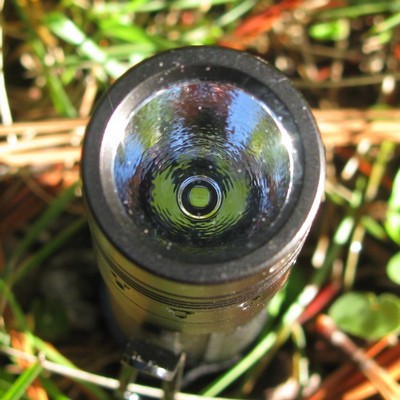Sunwayman V10A
Reviewer's Overall Rating: 5 out of 5
Summary:
| Battery: | AA or 14500 li-ion |
| Switch: | Forward clicky |
| Modes: | 1 infinitely variable |
| LED Type: | Cree XP-G R5 |
| Lens: | coated glass |
| Tailstands: | yes |
| Price Paid: | $53.68 |
| From: | DinoDirect |
| Date Ordered: | 19 Sept 2011 |
Pros:
- Forward clicky
- Infinitely variable output
- Very low Low
- Nice quality build
- Cool looking
- Good throw
Cons:
- No preset modes
- Gets hot on li-ion batteries
Features / Value: 3 out of 5
I saw a couple of Sunwayman lights when I went to GoingGear's store in town last year. They didn't have the V10A, but the M10A is very similar. The M10A has a magnetic ring and a few stops for different modes. But the Low wasn't all that low and the light wouldn't accept lithium-ion batteries, plus it is an expensive light and I didn't want to spend that much and not get everything just right. The V10A then came out with a very good Low, infinitely variable output, and would accept a 14500 lithium ion battery. I would have bought one except by that time I was hoping for a neutral tint version that was hinted at. As I waited, I realized the downside of the V10A was there was no way to get to a decent outdoor Low without guessing at where to set the magnetic ring. So I decided I wouldn't get one. But then DinoDirect did a group buy and made this $80 light available for about $55 and I figured I couldn't pass up a chance to get such a cool light. Even without the group buy, some people have been able to get the light for around $50 with a 20% off coupon. I'm not sure what coupons they have that are still valid though. So while I got a good deal on the light, at this price I still wouldn't say it is a great value, so one star off on value. Disclosure: The link above is an affiliate link giving me some kind of commission (maybe, we'll see; edit: doesn't appear to actually work, somehow not surprising) but that doesn't affect my review and the light is widely available from a number of dealers more reputable than DinoDirect though Dino has the best price I've seen after discounts.
For a more technical review of this light, Selfbuilt has a ton of pictures and graphs here at CPF.
As for features, this light doesn't have that many really and I'll take off one star for that. It does have infinitely variable output using a selector ring, putting it on par with the Nitecore Infinilux and the JETBeam RRT-0, both of which are $100+ lights (some say Sunwayman makes the RRT-0 for JETBeam and NiteCore is owned by JETBeam, so maybe they make the Infinilux too). It also has a forward clicky which I like for momentary On, but Sunwayman wisely made the brightness control separate from the tail clicky. I would still like to see some detents in the motion of the ring in order to know about what level of light I can expect when I turn on the light, though if you leave the ring where it is it will just come on at the level where you were last, so in that sense it function similarly to a light with memory. The Low on this is very faint, okay for up-close reading. It seems to be the same or even fainter than Moonlight mode of the Quark series. Plus you can have anything in between by turning the ring about a third of the way around the tube until it stops.
Design / Build Quality: 5 out of 5
Obviously the build quality is better than budget lights. The light seems to be only two pieces: head and body tube. The tail does not seem to come off separately. There is a big o-ring at the head that makes for a very tight seal. There are also big square threads, but they are quite short (maybe 2 turns?) and I kind of wish there were at least a little more.
I love the look of this light though. It seems like some kind of piece of high tech military equipment with all the surface details and fins. The clip seems kind of weak to me, since it just clips onto the light (and I think I chipped the anodizing taking it off once). There are grooves for the clip on both ends of the body so that you can install the clip head up or head down. Still, clipping it to a jeans pocket the light does not clip in place firmly and I wouldn't want to lose an expensive light. It's fine for walking but if you were running or in the woods where something could knock it off, it would be better to put the light down in a pocket. Though I'm not a fan of lanyards, it comes with a clip-on lanyard which messes up tailstanding.
The tail clicky is very good, not too firm or too mushy. In lower modes the light has a instantaneous ramp-up to brightness. And I guess I am so used to reverse clicky lights that I kind of miss instant Off. With a forward clicky you have to push in and let go before the light goes off. There are some good pack-ins, including spare o-rings, tail cap boot, and lanyard. There is no holster.
Battery Life: 3 out of 5
Battery life is respectable on AA, but fairly short on li-ion batteries. I'll propose this scale for scoring battery life. This works for any light: 1 for 0-15 minutes (don't laugh, this is how long some of my 10440 lights run); 2 for 15-30 minutes; 3 for 30-60 minutes; 4 for 60-120 minutes; and 5 for more than 120 minutes. So on AA, the light gets 3 stars for 50 minutes while for li-ion it gets only 2 stars for 25 minutes.
For the first runtime test, on AA NiMH I am using a 2000mAh white top Duracell precharged battery ("Duraloop"). I run the light on High and stop every 10 minutes to test the battery voltage (at rest) and get current readings. Because the light can be set to any level, I measured High as maximum and Low as minimum but you could get anything in between.
| Time (min) | Battery Voltage | Current High (mA) | Current Min (mA) |
| 0 | 1.415 | 2240 | 40 |
| 10 | 1.288 | 2170 | 40 |
| 20 | 1.268 | 2170 | 40 |
| 30 | 1.257 | 2180 | 40 |
| 40 | 1.234 | 2150 | 40 |
| 50 | 1.127 | 740 (dropping) |
The light seems pretty well-regulated on a NiMH battery with a pretty constant current draw for most of the life of the battery. Selfbuilt's review indicates the same thing.
On lithium ion batteries (900mAh Trustfire flame 14500), it is a different story. The light is much brighter, but has no real regulation, and runtime is pretty short. Still, it is at least twice as bright on li-ion so it is well worth it. Knowing life would be short, I measured every 5 minutes for this test. I ran the battery down to 3.6V and stopped, but missed my cutoff just a little. During this test the light got very warm very quickly, so I left it head down in a shallow pan of water for cooling.
| Time (min) | Battery voltage | Current High (mA) | Current Min (mA) |
| 0 | 4.18 | 1950 | 10 |
| 5 | 3.97 | 1800 | 10 |
| 10 | 3.84 | 1540 | 10 |
| 15 | 3.77 | 1490 | 10 |
| 20 | 3.71 | 1390 | 10 |
| 25 | 3.54 | 1100 | 10 |
A group photo of the Mr.Lite BLF AA-Y4E, Tank007 E07 BLF edition, Fenix L1D, and Sunwayman V10A, all AA powered lights. The Mr.Lite is a pretty big AA light and the V10A is almost as large:
Light Output: 5 out of 5
Sunwayman claims to use ANSI FL-1 standards and rates this light at 140 lumens of output on a AA battery. That seems about right to me. But on a li-ion battery, it might be 280 lumens, at least at first. The Sunwayman V10R, which uses a CR123A battery and the V20A which uses 2 AA cells, use the same circuitry for 210 ANSI lumens from 3 volts. The tint is cool white, but on maximum the light seems quite white and barely cool. At lower levels it seems a little cooler in tint. There seems to be a very shallow donut hole in the hotspot of the light, but it isn't too bad. I will say this light throws better than I thought possible on a AA light with such a small reflector, but it helps that it is cranking out so much light.
So here are some indoor shots with the lights 50cm from the wall and the V10A on the left. First here is a comparison using NiMH batteries (fresh Duraloops) in the Sunwayman and my Fenix L1D with a Cree XR-E Q5 LED. The XP-G puts out more light and has a bigger hotspot.
At 1/100th second:
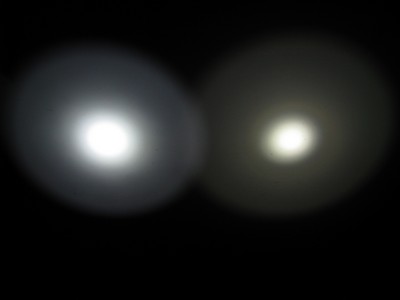
And at 1/400th second:
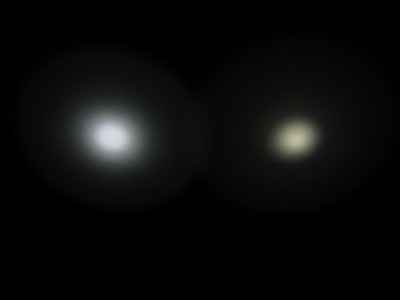
And at 1/1600th second, hotspot intensity seems just as good on the V10A, just bigger:
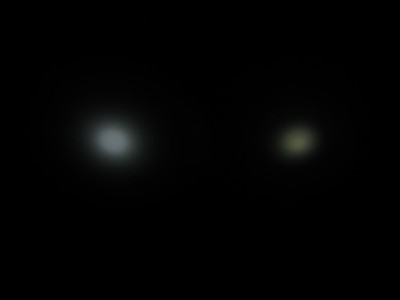
On li-ion, here is more fair comparison, with my Ultrafire X1, a compact 18650 light that has been modified with a neutral XP-G R4 and a NANJG 1.4A driver.
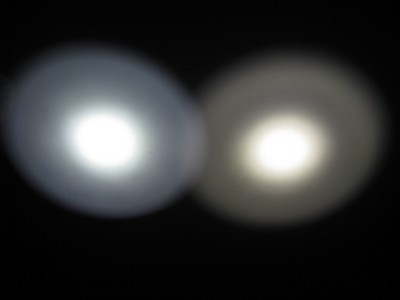
And at 1/400th second:
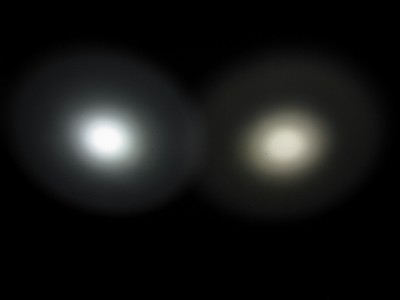
And at 1/1600th second. Being essentially direct driven, I think the V10A is brighter. Comparing these two outdoors there is really no competition with the V10A being brighter and throwier:
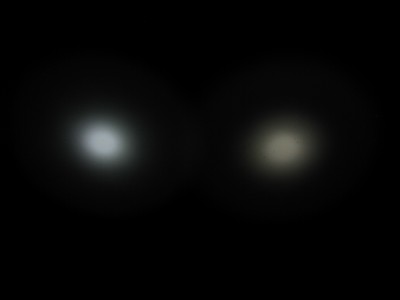
Okay, now some outdoor shots. These are 4-second exposures to get something that looks kind of like real life. The plant is about 25 feet away. The overhanging branches are about 35 feet away and the lights are aimed at the fence posts 120 feet in the distance. Here is the V10A on a fresh AA NiMH:
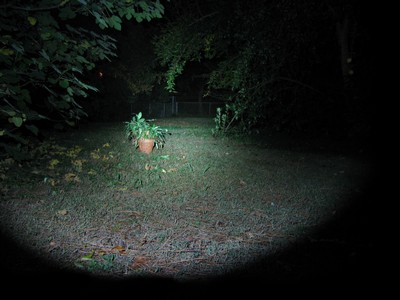
Now on a fresh Trustfire flame 14500 li-ion battery (you can mouse over the picture above to compare the two directly):
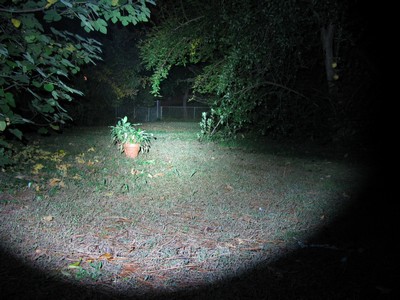
For the comparison shots with other lights, you can mouse over to see the Sunwayman. So first here is the modified Ultrafire X1 with a XP-G R4 on High. On a fresh battery, the X1 driver will limit the current to 1.4A while the V10A doesn't, so the V10A is brighter. Plus the V10A has a R5 and the X1's LED is R4:
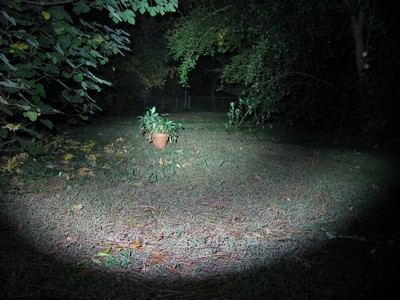
Now here is the Fenix L1D on NiMH in Turbo mode (advertised as 140 lumens) with a mouseover of the V10A on NiMH:
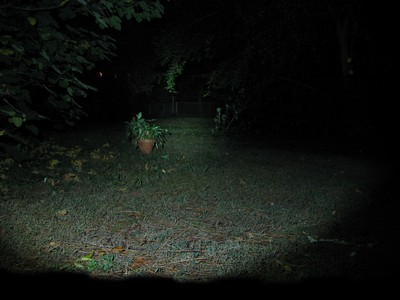
And the Fenix with a 14500 lithium-ion (which is probably 180 lumens):
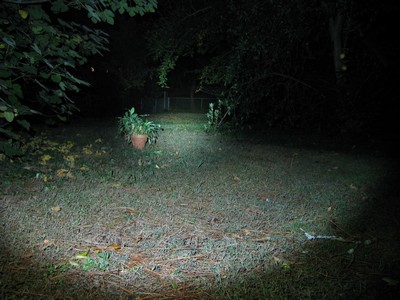
Now here is the BLF Tank007 E07 on High. This isn't a fair comparison because the Osram LED isn't anywhere close to as bright as a XP-G, but I know a lot of people own the E07. So first with a NiMH:
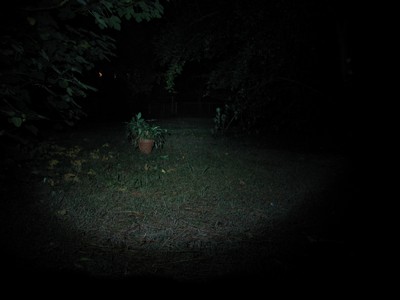
And now on li-ion. I have done some testing on the Tank007 and it has nowhere close to the same draw as the V10A, so again, there is a big disparity.
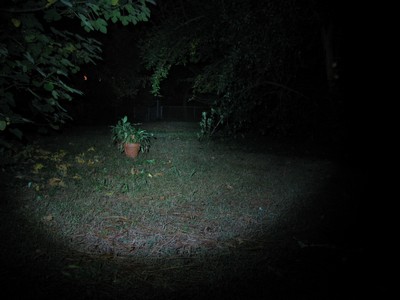
And one more, since all of the lights so far have inferior LED's. Here is the Uniquefire UF-2100 with a XM-L T6 and powered by a 18650 (full review here). The size is at least somewhat similar since the UF-2100 is pretty compact.

Summary: 5 out of 5
I am pleased with the light. It's still not perfect: I'd prefer a neutral white LED and some stops on the control ring to make it easier to switch from High to a Low or Medium without guessing where to turn the ring. The clip isn't perfect either. But I like the forward clicky, the variable output, the look, and the super bright using a 14500. The build quality is excellent as well. It is a simple concept for a light that is well executed.
